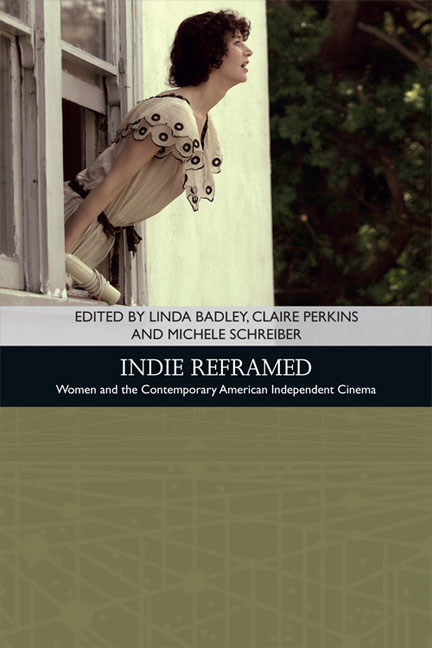14 - Miranda July and the New Twenty-first-century Indie
Published online by Cambridge University Press: 10 November 2020
Summary
This essay reframes the masculinist rhetoric that has dominated discussion, both popular and academic, of independent cinema. That rhetoric articulates white male directors and their films as exemplary (e.g., Steven Soderbergh/sex, lies, and videotape, Quentin Tarantino/Pulp Fiction) and then derives the character and characteristics of indie cinema and its edgy auteurs from these examples. The oft-referenced indie ‘maverick’ or ‘outsider’ or ‘renegade’ clearly invokes a masculine and imperialist American archetype – the Western outlaw hero – who breaks the law in order to save it, who revitalises the staid traditions of Hollywood from its aesthetic and economic margins.
Alongside and within this ‘outsider tradition’ are ‘other’ filmmakers, women and people of colour, who are frequently mentioned, but rarely discussed. When they are, critical indie rhetoric articulates these directors and their films either as singular and exceptional or as exemplars for their gender or identity group. This chapter will challenge this critical rhetoric in relation to independent women filmmakers. Despite Barbara Loden's early and brilliant Wanda (1970) or Julie Dash's poetic tour de force, Daughters of the Dust (1992), or Lizzie Borden's very edgy Born in Flames (1983), none have served as exemplars of indie cinema. This essay proposes an experiment that will posit contemporary indie director Miranda July as an exemplar of twenty-first-century indie cinema. What character and characteristics emerge?
LOGICS OF EXEMPLARITY
Whether addressing genre, auteur, counter or independent, national or transnational cinema, film critics and theorists frequently argue from exemplary figures or films whose specificities illustrate or typify their more general conceptual assertions. For example, Peter Wollen's 1972 ‘Godard and Counter- Cinema: Vent d’Est’ establishes seven binaries drawn from Godard's films that contrast counter-cinema's fundamental textual practices with those of ‘orthodox’ cinema. Over forty years later, our categories are much more fraught and multifaceted, but the critical role of the exemplary persists. The scholarship on independent/indie cinema engages critical questions such as: What is it? Who is included and why?
This essay begins with an overview of the recent critical literature on American independent cinema.
- Type
- Chapter
- Information
- Indie ReframedWomen's Filmmaking and Contemporary American Independent Cinema, pp. 239 - 254Publisher: Edinburgh University PressPrint publication year: 2017



